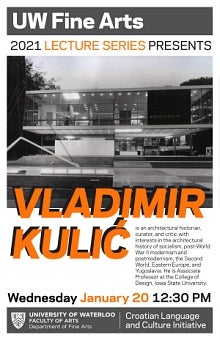
To view the lecture online please register at the Webex link: https://uwaterloo.webex.com/uwaterloo/onstage/g.php?MTID=efacb2aa7acbb02ac1c5c5b77107b2830. For more information on the lecture, or on how to log on to the Webex platform, please send your questions to Bojana Videkanic or Sharon Dahmer.
Dr. Vladimir Kulić is an architectural historian, curator, and critic with interests in the architectural history of socialism, post-World War II modernism and postmodernism, the Second World, Eastern Europe, and Yugoslavia. He is Associate Professor at the College of Design, Iowa State University. In collaboration with Martino Stierli, Vladimir curated the widely acclaimed exhibition Toward a Concrete Utopia: Architecture in Yugoslavia, 1948-1980 at MoMA in New York (July 2018-January 2019). His books include Modernism In-Between: The Mediatory Architectures of Socialist Yugoslavia (2012), Sanctioning Modernism: Architecture and the Making of Postwar Identities (edited with Monica Penick and Timothy Parker, 2014), Bogdanović by Bogdanović: Yugoslav Memorials through the Eyes of Their Architect (2018), and the edited volume Second World Postmodernisms: Architecture and Society Under Late Socialism (2019).